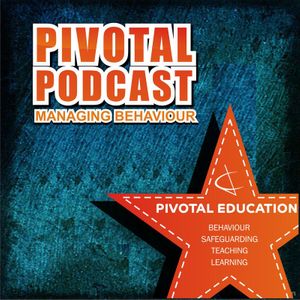Ceri Stokes – Empowering Safeguarding Leads – PP177
Pivotal Podcast - A podcast by Pivotal Education

Categories:
We speak to Ceri Stokes about her role as a Assistant Head and Designated Safeguarding Lead at a residential school to find out about how she found herself looking after this crucial area of school life. Ceri works at Kimbolton School, which is a co-educational day and boarding school of 950 pupils aged 4 to 18. In common with a lot of DSLs, Ceri found herself in the role after the post-holder in her school went on maternity leave. She points out that most DSLs take on the role in order to help children but few realise just how much admin there is to do as well. “A lot of the role is making phone calls, chasing people and being a nag.” “It’s really difficult when you have to point out that others are not dong their jobs.” Ceri makes sure she plans her lessons over the Summer so she can be on the phone sorting out safeguarding issues and then run to her classroom to start a lesson without appearing to prepare for it. Often, as a DSL, you can be sorting out a huge issue one day and then there’s nothing on you plate the next day – so you can be pro-active – but there’s never really enough time to be pro-active which is what you know you should be doing. How you do ensure you remain balanced despite the physical and emotional demands of being a DSL? Ceri runs a girls’ boarding house as well as being DSL so it’s certainly a packed schedule and she admits she doesn’t feel like she manages the balance well but the boarding house is actually what she refers to as ‘her sanity’ because the students share their important life events with her. It’s all ‘normal’ which is a direct contrast to the DSL work where everything always seems to be challenging news. Ceri also tries to empower her staff to make decisions and tries not to be a control freak with them. So when she’s off-duty she makes sure she really is completely off-duty and the rest of the staff can take decisions without her. She also goes running quite a lot. “No-one can ring me no-on can email me while I’m running so I quite like that.” Ceri sees a problem with DSLs not having worked out how they can offload some of the very difficult experiences to others. There is a serious need for supervision for DSLs to ensure their professional and emotional well-being. How does the Safeguarding Culture work in your setting? Overt the past 5 years, Ceri thinks the culture around Safeguarding has changed significantly in her school and become much more of a whole-school focus. One of the best things she did was to get her school Bursar (School Business Manager) trained in Safeguarding. This meant that he could take on responsibility for training others like the ground staff and maintenance staff to take the load off Ceri. Also, id Ceri asks for money, her bursar understands what she’s going through and can make decisions based on real knowledge of the needs of the school in this area. The school also now have a good, secure computer system to share safeguarding information. “Every Monday morning we have an email coming out from a different member of staff and it can be anything related to keeping children safe.” So the responsibility is shared – everyone knows that at some point they will have to write the Monday morning email so it keep safeguarding at the front of their minds. What tips do you have for DSLs working with multi-agencies? The first thing Ceri did was to phone up the local MASH (Multi-Agency Safeguarding Hub) and arrange for herself to visit them. 6 months later she emailed again and eventually she was able to sit for a morning in the local office and listen to the team answering phone calls and having conversations and meetings. She learned a huge amount. Ceri didn’t have time to get to know everyone in the Safe...